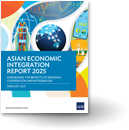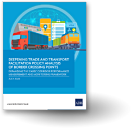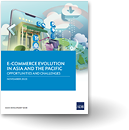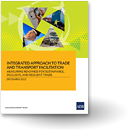Cross-border Infrastructure
Asia-Pacific Economic Cooperation (APEC) Transportation Working Group (TPTWG), Energy Working Group (EWG), and Telecommunications and Information Working Group (TEL)
The Asia-Pacific Economic Cooperation (APEC) was established in 1989 to enhance economic growth and prosperity for the region and to strengthen the Asia-Pacific community. APEC currently has 21 member economies: Australia; Brunei Darussalam; Canada; Chile; the People’s Republic of China; Hong Kong, China; Indonesia; Japan; the Republic of Korea; Malaysia; Mexico; New Zealand; Papua New Guinea; Peru; the Philippines; Russia; Singapore; Taipei,China; Thailand; the United States; and Viet Nam.
The Transportation Working Group (TPTWG), launched in 1991, seeks to liberalize of transportation services, and enhance the safety of APEC transport systems in order to encourage economic development in the Asia-Pacific region. At the same time parallel measures are being undertaken by economies to strengthen security in all modes of transportation, namely, land, sea, and air transport.
The Energy Working Group (EWG), launched in 1990, seeks to maximize the energy sector’s contribution while mitigating the environmental effects of energy supply and use. Key EWG initiatives relate to energy security and sustainable development.
The Telecommunications and Information Working Group (TEL) was formed in 1990 and aims to improve telecommunications and information infrastructure in Asia and the Pacific region by developing and implementing appropriate telecommunications and information policies, including relevant human resource and development cooperation strategies.
Agreements
- The 27th APEC Economic Leaders' MeetingAsia Pacific Economic Cooperation (APEC)20 Nov 2020
- Joint Ministerial Statement - 31st APEC Ministerial Meeting 2020Asia Pacific Economic Cooperation (APEC)16 Nov 2020
- APEC Ministerial Chair's StatementAsia Pacific Economic Cooperation (APEC)15 Nov 2018
- Ministerial Statement - 10th Transportation Ministerial Meeting 2017Asia Pacific Economic Cooperation (APEC)7 Oct 2017
- Joint Ministerial Statement - 9th Transportation Ministerial Meeting 2015Asia Pacific Economic Cooperation (APEC)8 Oct 2015
News
- [People's Republic of] China calls for building 'inclusive' Asia-Pacific, urges digital, green transformationsAnadolu Agency10 Feb 2026
- [People's Republic of] China's hosting of APEC meeting to boost regional cooperation, global growth: officialXinhua News Agency8 Feb 2026
- Singapore: Australia's TPG Telecom agrees network sharing deal with Singtel's OptusChannel News Asia29 Apr 2024
- Strong digital infra for [Philippines] startup firms pushedCNN Philippines29 Nov 2023
Opinions and Editorials
- Development of Thailand's [Eastern Economic Corridor] in alignment with APEC aspirationsBangkok Post24 Oct 2022
- APEC eyeing LNG market expansion in Asia-PacificRIA Novosti9 Nov 2014
- Shaping Asia-Pacific's futureAsia One3 Nov 2014
- A new bank for Asia, not [People's Republic of] ChinaTODAY16 Oct 2014
Studies and Research
- Mainstreaming Gender in the Transport Workforce for SustainabilityAsia-Pacific Economic CooperationAsia Pacific Economic Cooperation (APEC)1 Nov 2024
- APEC: Quality Transport VisionAPEC Transportation Working GroupAsia Pacific Economic Cooperation (APEC)1 Apr 2016
- APEC Green Building Code Infrastructure GuideA. KhanAsia Pacific Economic Cooperation (APEC)1 May 2015
- APEC Public-Private Dialogue on Identifying and Addressing Impediments to Improve a Business-Friendly Infrastructure Investment in the APEC RegionAsia Pacific Economic Cooperation (APEC)1 Mar 2015
Meetings
- 10th Transportation Ministerial Meeting 2017Asia Pacific Economic Cooperation (APEC)7 Oct 2017
- 2015 APEC Transportation Ministerial MeetingAsia Pacific Economic Cooperation (APEC)9 Oct 2015
- 10th Meeting of the Telecommunications and Information MinistersAsia Pacific Economic Cooperation (APEC)31 Mar 2015
- APEC 2012 Leaders WeekAsia Pacific Economic Cooperation (APEC)2 Sep 2012




